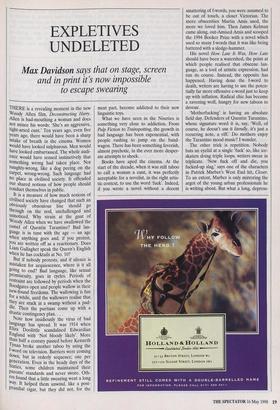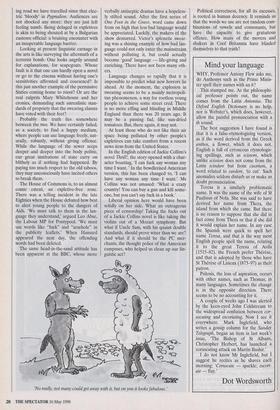EXPLETIVES UNDELETED
Max Davidson says that on stage, screen
and in print it's now impossible to escape swearing
THERE is a revealing moment in the new Woody Allen film, Deconstructing Harry. Allen is bad-mouthing a woman and does not mince his words: 'She's an aggressive, tight-arced cunt.' Ten years ago, even five years ago, there would have been a sharp intake of breath in the cinema. Women would have looked sulphurous. Men would have looked embarrassed. The whole audi- ence would have sensed instinctively that something wrong had taken place. Not naughty-wrong, like a dog peeing on the carpet, wrong-wrong. Such language had no place in civilised society. It offended our shared notions of how people should conduct themselves in public. It is a measure of how much notions of civilised society have changed that such an obviously obnoxious line should go through on the nod, unchallenged and unnoticed. Why strain at the gnat of Woody Allen when we have swallowed the camel of Quentin Tarantino? Bad lan- guage is in tune with the age — an age when anything goes and, if you protest, You are written off as a reactionary. Does Liam Gallagher speak the Queen's English when he has cocktails at No. 10?
But if nobody protests, and if silence is mistaken for acquiescence, where is it all going to end? Bad language, like sexual promiscuity, goes in cycles. Periods of restraint are followed by periods when the floodgates open and people wallow in their new-found freedoms. The wallowing is fun for a while, until the wallowers realise that they are stuck in a swamp without a pad- dle. Then the puritans come up with a drastic contingency plan. . . . Note how insidiously the virus of bad language has spread. It was 1914 when Eliza Doolittle scandalised Edwardian England with 'Not bloody likely'. More than half a century passed before Kenneth Tynan broke another taboo by using the f-word on television. Barriers were coming down, but in orderly sequence; one per generation. Even in the heady days of the Sixties, some children maintained their parents' standards and never swore. Oth- ers found that a little swearing went a long Way. It helped them unwind, like a post- prandial cigar, but they did not, for the most part, become addicted to their new linguistic toys.
What we have seen in the Nineties is something very close to addiction. From Pulp Fiction to Trainspotting, the growth in bad language has been exponential, with people rushing to jump on the band- wagon. There has been something feverish, almost psychotic, in the ever more desper- ate attempts to shock.
Books have aped the cinema. At the start of the decade, when it was still taboo to call a woman a cunt, it was perfectly acceptable for a novelist, in the right artis- tic context, to use the word 'fuck'. Indeed, if you wrote a novel without a decent smattering of f-words, you were assumed to be out of touch, a closet Victorian. The more obscenities Martin Amis used, the more we loved him. Then James Kelman came along, out-Amised Amis and scooped the 1994 Booker Prize with a novel which used so many f-words that it was like being battered with a sledge-hammer.
His novel How Late It Was, How Late should have been a watershed, the point at which people realised that obscene lan- guage, as a tool of artistic expression, had run its course. Instead, the opposite has happened. Having done the f-word to death, writers are having to use the poten- tially far more offensive c-word just to keep up with inflation. Radical chic has become a ravening wolf, hungry for new taboos to devour.
`Motherfucicing' is having an absolute field day. Defenders of Quentin Tarantino, whose signature word it is, say, 'Well, of course, he doesn't use it literally, it's just a recurring note, a riff.' Do mothers enjoy the Tarantino mood music? I wonder.
The other trick is repetition. Nobody bats an eyelid at a single 'fuck' so, like ice- skaters doing triple loops, writers swear in triplicate. 'Now fuck off and die, you fucked-up slag,' says one of the characters in Patrick Marber's West End hit, Closer. To an extent, Marber is only mirroring the argot of the young urban professionals he is writing about. But what a long, depress- ing road we have travelled since that elec- tric 'bloody' in Pygmalion. Audiences are not shocked any more: they are just left feeling numb. Being deluged in expletives is akin to being shouted at by a Bulgarian customs official: a bruising encounter with an insuperable language barrier.
Looking at present linguistic carnage in the arts is like surveying the aftermath of a terrorist bomb. One looks angrily around for explanations, for scapegoats. Whose fault is it that one can hardly open a novel or go to the cinema without having one's sensitivities affronted and coarsened? Is this just another example of the permissive Sixties coming home to roost? Or are the real culprits Mary Whitehouse and her cronies, demanding such unrealistic stan- dards of propriety that the swearing classes have voted with their feet?
Probably the truth lies somewhere between the two. We have certainly failed, as a society, to find a happy medium, where people can use language freely, nat- urally, robustly, without giving offence. While the language of the sewer seeps deeper and deeper into the body politic, our great institutions of state carry on blithely as if nothing had happened. By paying too much respect to the old taboos, they may unconsciously have incited others to break them.
The House of Commons is, to an almost comic extent, an expletive-free zone. There was a telling incident in the late Eighties when the House debated how best to alert young people to the dangers of Aids. 'We must talk to them in the lan- guage they understand,' argued Leo Abse, the Labour MP for Pontypool. 'We must use words like "fuck" and "arsehole" in the publicity leaflets.' When Hansard appeared the next day, the offending words had been deleted.
The same head-in-the-sand attitude has been apparent at the BBC, whose more verbally antiseptic dramas have a hopeless- ly stilted sound. After the first series of One Foot in the Grave, word came down from on high that less bad language would be appreciated. Luckily, the makers of the show demurred. Victor's splenetic swear- ing was a shining example of how bad lan- guage could not only enter the mainstream without polluting it, but could actually become 'good' language — life-giving and enriching. There have not been many oth- ers.
Language changes so rapidly that it is impossible to predict what new horrors lie ahead. At the moment, the explosion in swearing seems to be a mainly metropoli- tan phenomenon, a way for rootless young people to achieve some street cred. There is no more effing and blinding in Middle England than there was 20 years ago. It may be a passing fad, like sun-dried tomatoes. But, there again, it may not.
At least those who do not like their air space being polluted by other people's expletives can take comfort from a recent news item from the United States.
In the English edition of Jackie Collins's novel Thrill!, the story opened with a char- acter boasting, 'I can fuck any woman any time I want. ' In the bowdlerised American version, this has been changed to, 'I can have any woman any time I want.' Ms Collins was not amused: 'What a crazy country! You can buy a gun and kill some- one, but you can't say fuck in a book.'
Liberal opinion here would have been solidly on her side. What an outrageous piece of censorship! Taking the fucks out of a Jackie Collins novel is like taking the violins out of a Mozart symphony. But what if Uncle Sam, with his quaint double standards, should prove wiser than we are? And what if it should be the PC mer- chants, the thought police of the American campuses, who helped us clean up our lin- guistic act?
No really, not many could get away with it, but on you it looks fabulous.' Political correctness, for all its excesses, is rooted in human decency. It reminds us that the words we use are not random com- binations of vowels and consonants, but have the capacity to give gratuitous offence. How many of the movers and shakers in Cool Britannia have blinded themselves to that truth?



























































 Previous page
Previous page